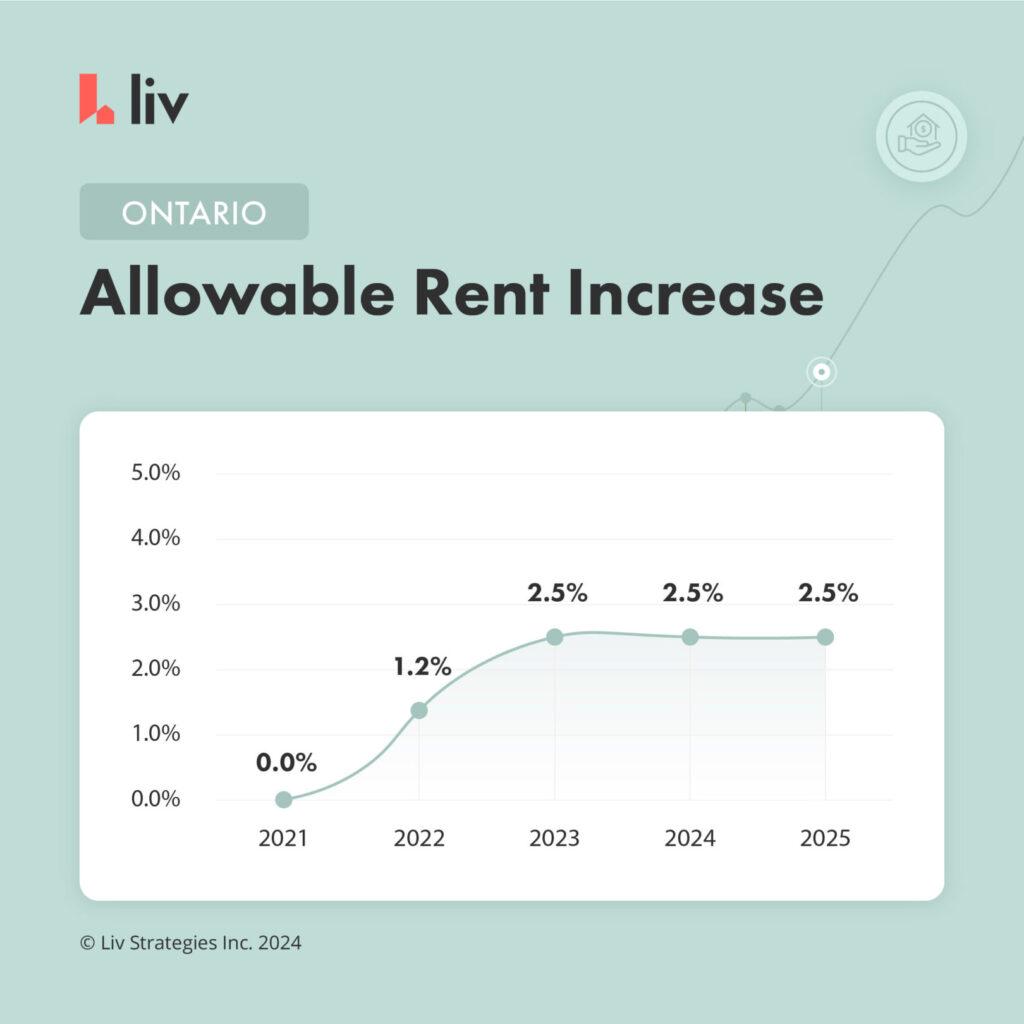Another year means the possibility of another rent increase for Ontario renters and landlords. Since announcing a temporary rent freeze in 2021, the province’s Landlord and Tenant Board has resumed the release of yearly rent increase guidelines, with the latest numbers for 2026 recently announced in 2025. For those worried about steep rent hikes though, rest assured — landlords can only raise the rent up to a maximum amount dictated by the LTB. Just how much can landlords raise rent though? Today, liv.rent will be covering everything Ontario landlords and renters need to know about rent increases including the maximum allowable rent increase for 2026, when and how rent increases can occur, new Bill 60 and more.
Join Our Newsletter
For more info on rental laws and policies (e.g. eviction, lease agreements, repairs & maintenance), subscribe to get the latest news.
What renters need to know about rent increases
Ontario rent increase rules 2026
What is the 2026 rent cap?
The Ontario rent increase guideline for 2026 is set at 2.1%, meaning landlords cannot raise rent more than 2.1% in a given year without special approval.
Bill 60, the Fighting Delays, Building Faster Act, 2025, was passed on November 24, 2025, and introduces major changes to Ontario’s rental system. The bill affects how leases renew and accelerates eviction timelines, shifting the balance between stability for tenants and flexibility for landlords.
In 2025, as with previous years, landlords may increase the rent price of their rented units in line with provincially set limits. In Ontario and some other Canadian provinces, tenancy boards outline a maximum allowable rent increase each year based on a variety of factors such as mortgage rates and the Consumer Price Index. The limits governments set typically mirror inflation, though this year proves that this isn’t a hard and fast rule, since in both 2024 and 2025, Ontario has set the province’s rent increase limit below the rate of inflation.
Rent increases for 2025 cannot take effect prior to January 1st, 2025, and a minimum of 90 days’ notice must be given prior to any increase using the proper notice of increase form. Landlords can also raise the rent for tenanted units only once every 12 months, and a minimum of 12 months must have passed since the tenant moved in.
Note that the above rules only apply if you are currently renting a unit and your landlord wishes to raise the rent. If a lease term comes to an end and the landlord chooses to re-list the unit, the maximum allowable rent increase doesn’t apply to the price they rent to a new tenant.
What you need to know about rent increases
Ontario landlords are able to raise rent for standing tenancies up to the provincially set maximum amount, but they need to be careful to follow the proper procedures to avoid breaking any rules. The rent you charge doesn’t increase automatically when the province raises its rates. Instead, Ontario landlords must give tenants 90 days written notice, using the proper form from the Landlord and Tenant board, available for download here. Depending on the type of unit and other factors, this will be either an N1, N2, or N3 Notice of Rent Increase.
Additionally, rent can only be raised 12 months after either the last rent increase or the date the tenancy begins if this is the first time the landlord is raising rent. These restrictions also don’t apply to vacant units, commercial units, long-term care homes, and community housing units. Landlords may also be permitted to raise their rent by more than the provincial guideline, but they’ll first need to apply to the Landlord and Tenant Board.
For specific guidelines on how much landlords can raise rent for 2024, please see below.
How much can a Landlord Raise the rent in Ontario in 2025?
For rent increases that take place before the end of 2024, Ontario landlords can raise tenants’ rent by up to 2.5% so long as they issue the proper notice at least 90 days before the increase.
Effective January 1st, 2025, Ontario landlords can raise rent prices by up to an additional 2.5% for existing tenancies, according to the province’s Landlord and Tenant Board so long as they follow the same guidelines.
You can find Ontario’s allowable rent increases from year to year here:

Looking ahead: interest rates and rent increases
Ontario typically announces the province’s rent increase guidelines in June of each year, so questions landlords and renters have about interest rates affecting rent increases have largely already been answered. Ontario has shown a willingness to set rent increase guidelines below Canada’s 3.1% average inflation rate, which is good news for renters in particular.
Though inflation has largely been tamed as of the time of writing, further announcements from the Bank of Canada are still on the horizon and their effects on rent increase limits in 2026 and beyond are still uncertain.
>> Recommended Reading: [Updated July 13, 2022] Rising interest rates and rental properties: what landlords need to know
FAQ: Rent increases in Ontario
how much can a landlord increase rent in Ontario 2026?
Ontario has set a limit of 2.1% for rent increases in 2026. The guideline is the maximum a landlord can increase most tenants’ rent during a year without the approval of the Landlord and Tenant Board.
You can find more about rent increases and how to calculate them here.
What is the notice of rent increase Ontario?
In most cases, the rent for a residential unit can be increased if at least 12 months have passed since the:
- last rent increase, or
- date the tenancy began
The landlord must give a tenant written notice of a rent increase in the proper form at least 90 days before it takes effect.
When can my landlord increase my rent in Ontario?
In Ontario, landlords can only increase rent once in a 12-month period and only 12 months after the date of the last legal rent increase — or the tenant moving in. Landlords must also give tenants a minimum of 90 days’ notice that an increase is imminent.
This means that if your rent was increased in April 2024, your landlord can implement another increase as soon as April 2025, and must provide a written warning by January 2025 at the latest.
What are the exceptions?
Landlords in Ontario can only raise rent by more than the allowable limit in certain situations:
- Landlords may apply to the Landlord and Tenant Board for permission to raise rent by more than the allowable limit.
- In Care Homes, rent increase guidelines only apply to the rent portion of monthly expenses — not the cost of services.
- New buildings, additions to existing buildings and the majority of new basement apartments that are occupied for the first time for residential purposes after November 15, 2018 are exempt from rent control.
What does allowable rent increase percentage mean?
The legislation specifies that a rent increase cannot exceed the percentage amount. If you paid $1000 per month for all of 2024, then your landlord cannot increase your rent by more than $25 in 2025 (1000 x 2.5%).
Also, a landlord cannot round up any cents left when calculating the increase. For example, if your rent is $1250 and the maximum allowable increase is $31.25, your landlord can issue a Notice of Rent Increase for $1281.25, not $1282.
How is the allowable rent increase percentage calculated?
Each June, the Ontario LTB issues the maximum allowable increase percentage for the upcoming calendar year. Based on the Consumer Price Index in Ontario up to April, the allowable rent increase mirrors the rate of inflation.
In response to rapidly rising interest rates across the country, Ontario has decided to cap rent increases at 2.5% for 2025 below the 2.9% inflation rate.
What are the reasons for rent increase in Ontario?
There are many reasons why your landlord may increase rent, such as an increase in property taxes, maintenance fees, mortgage payments and more. For 2024 in particular, rising interest rates played a large role in dictating larger allowable rent increases, though like Ontario, many provinces may decide to cap rent increases below inflation.
When faced with a notice of rent increase, always be willing to have open communication with your landlord. If you won’t be able to afford the increase in price, reach out and have a conversation about it. Reasons may be personal and specific for each landlord.
What if my landlord increased my rent higher than the allowable amount?
You do not have to pay an increase that is higher than the amount allowed by law. If your landlord’s rent increase has exceeded the legal amount, and you have already paid rent under said increase, you may deduct any overpayments from future rent. Again, speak to your landlord if you believe you have been overcharged.
What is the average increase in rent per year in Onatario?
In Ontario, rent increases are governed by strict guidelines set by the province’s LTB. For 2022, this amount was fixed at a maximum of 1.2% while in 2023, 2024 and 2025 the maximum was 2.5%.
Typically, landlords who increase rent will use the maximum amount, so this also reflects the average rent increase from year to year.
What is a fair Ontario rent increase 2025 percentage?
While the annual allowable rent increase is an indicator of the maximum rent increase, your landlord may want to adjust this to fit your situation and the rental market. See how your rent compares to the average city and neighbourhood rental price.

Rethink The Way You Rent
Not on liv.rent yet? Experience the ease of digital applications & contracts, verified tenants & landlords, virtual tours and more – all on one platform. Sign up for free or download the app.
Subscribe to receive the latest tenant & landlord tips and get notified about changes in the Canadian rental market.
>> Stay up-to-date on the average rent in Vancouver, Toronto and Montreal: Rent Reports.




0 Comments